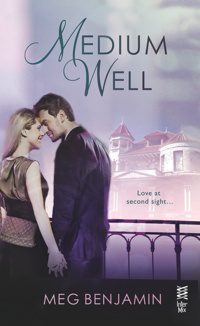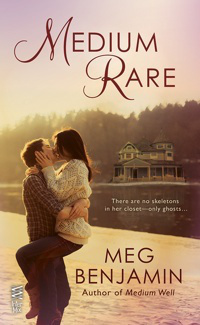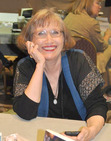Meg Benjamin's Blog, page 10
August 20, 2014
The “Authentic” Voice
 I enjoy showbiz biographies, the good, the bad, and even the ugly. If you’re an old-time movie fan like me, it’s fun to read anecdotes from people who were involved in making pictures you enjoy—or even pictures you didn’t like much. My most recent read was Robert Wagner’s autobiography Pieces Of My Heart, and I enjoyed it immensely.
I enjoy showbiz biographies, the good, the bad, and even the ugly. If you’re an old-time movie fan like me, it’s fun to read anecdotes from people who were involved in making pictures you enjoy—or even pictures you didn’t like much. My most recent read was Robert Wagner’s autobiography Pieces Of My Heart, and I enjoyed it immensely.
Wagner, of course, started out as a juvenile lead, one of a group of young leading men that included Tony Curtis and Rock Hudson. But unlike some of the others in that group, Wagner has managed to keep working for the past sixty years or so, moving from leading man to character actor and from movies to television when the opportunity presented itself. Sadly, he’s also well-known for his marriage to Natalie Wood, which ended in her accidental death aboard their boat, the Splendor.
I said I enjoyed Wagner’s book immensely, and I did. It was written with style and verve and a nice balance between personal stories and views of the industry as it changed from old Hollywood to new. After I finished reading, I checked the reviews on Amazon out of curiosity to see if others enjoyed the book as much as I did. For the most part they did, but one negative review struck me particularly. The reader was outraged that Wagner had written the book with a collaborator, Scott Eyman. From the reader’s point of view, the presence of a collaborator meant that the voice in the book couldn’t be Wagner’s. The book was, therefore, a cheat, an inauthentic voice.
Now I obviously have no way of knowing how “authentic” the voice here is, just as I have no way of knowing what the working relationship was between Eyman and Wagner. Clearly, some collaborators do more than others. At least the collaboration in Pieces Of My Heart is acknowledged—not all celebrities are willing to admit they had help. And the experiences described are obviously Wagner’s. The book’s style is tremendously appealing and tremendously readable. Is that style Eyman’s or Wagner’s? I have no idea.
However, I’ve read or tried to read a few showbiz biographies that were written with little editorial help. I remember one recent one by a comedienne I particularly admired—I gave up before the end of the first chapter. It was close to unreadable.
The reader/reviewer who trashed Wagner would probably find that book more “honest,” but he would also find it a lot less easy to read. I’d argue that Wagner’s decision to work with a professional writer was a good one. He has a story worth telling, and one that deserved to be told well.
And I have a secret for the reader/reviewer: none of us does it alone, or at least we don’t if we’re smart. Even self-published authors hire editors if they know what they’re doing. Facility with language is a gift, and not everyone has it in equal amounts. Moreover, it’s very difficult to read your own prose objectively. At the very least critique partners and beta readers can give you a quick jolt of reality.
So Wagner had a collaborator, and together they wrote an absorbing book. The voice in this book may or may not be Wagner’s, but it’s an interesting voice that serves the story well. Given my choice, I’d far rather read a well-written collaboration than the alternative. More power to them both.


August 7, 2014
Letting It Go
 So William Giraldi wrote this article in the New Republic a couple of months ago about Fifty Shades of Grey. You’ll notice I’m not providing a link to said article—feel free to look it up if you want, but I’m not giving Giraldi any more clicks than he’s already gotten. The article is another in a long series of articles by various authors meant to demonstrate the author’s cleverness by trashing the book. None of them has seemed to slow down EL James.
So William Giraldi wrote this article in the New Republic a couple of months ago about Fifty Shades of Grey. You’ll notice I’m not providing a link to said article—feel free to look it up if you want, but I’m not giving Giraldi any more clicks than he’s already gotten. The article is another in a long series of articles by various authors meant to demonstrate the author’s cleverness by trashing the book. None of them has seemed to slow down EL James.
I haven’t read Fifty Shades of Grey, and I can’t really comment on it beyond being mildly annoyed by those who insist on using the term “mommy porn” to describe it. Had Giraldi confined himself to trashing the book, I’d have no more to say about it than about Dave Barry’s trashing of the book (which is considerably funnier).
But Giraldi used Fifty Shades of Grey as a jumping off point to trash romance and romance readers in general. In many ways the reaction among romance writers to this aspect of his article was far more interesting than the original article (but then just about anything would be). The response in Smart Bitches, Trashy Books is a good summary. But my question here is maybe more fundamental: Why bother?
Articles trashing romance are a regular feature of high brow discourse. And every time one is published, we trot out the same responses. Romance is the most popular form of genre fiction. Romance is dominated by women and sometimes gets trashed because of it. Romance is a huge genre with a large set of subgenres, as well as a dizzying variety of writing styles and registers. It can’t be lumped together into one basket and dismissed. And the response to these counter arguments is always a massive shrug. The literary fiction establishment and male critics in particular are hostile to romance, and probably always will be.
Romance has three characteristics that these guys (and I use that word advisedly) object to: it’s written by women, it invariably has a happy ending, and since it concerns romantic relationships, it usually (but not always) includes fairly explicit sexual activity. None of these characteristics is likely to change, and thus neither is the reaction to romance in general.
So why bother to respond at all? Yes, Giraldi is tremendously annoying, as well as flat out wrong about several things. For example, he seems to believe that women who read romance read nothing else and thus have no acquaintance with Great Literature. As someone who has probably read at least as much of that Great Literature as Giraldi (including Beowulf in the original Anglo-Saxon), I call bullshit.
But here’s the point: you won’t convince him. And there’s no reason to try. Giraldi can read what he likes and so can we. Neither of us is likely to have any impact on the other. The Romance Writers of America have expended a great deal of effort to improve romance’s reputation, but they can’t stop guys like Giraldi. Meanwhile, those of us who read and write romance go about our business, occasionally grinding our teeth at the William Giraldis of the world.
Yeah, those guys are snots. So what? As long as publishers go on publishing the books we like to read, who cares? And frankly, given the profits to be found in publishing romance, I’m fairly certain that nobody’s going to shut romance down. So let’s let Giraldi go off and read his Thomas Pynchon in peace. Maybe if we don’t jab at him, he’ll forget about us. And maybe if we don’t click on his article, the rest of the world will also forget about him. And that, my friends, would be a satisfying conclusion.


July 18, 2014
The Problem With Writing ���Advice���
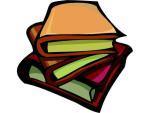 So I���m sitting in this workshop listening to this Very Famous Writer (VFW) talk about how to write. She���s obviously a major catch for the workshop organizers because she���s willing to spend over an hour telling aspiring writers how to do it. Now I���m well past the aspiring point (for better or worse), but I���m in the workshop too because I respect this particular writer and I���m interested in hearing what she has to say.
So I���m sitting in this workshop listening to this Very Famous Writer (VFW) talk about how to write. She���s obviously a major catch for the workshop organizers because she���s willing to spend over an hour telling aspiring writers how to do it. Now I���m well past the aspiring point (for better or worse), but I���m in the workshop too because I respect this particular writer and I���m interested in hearing what she has to say.
Early in her presentation she picks up a pile of papers and waves them at the audience. Apparently they���re a printout from an online workshop on creating characters. She doesn���t show them to us, but I have a pretty good idea what they include: a profile for each character, backstory for each character, probably goals/motivation/conflict for each character. Pretty standard stuff. But the VFW is having none of it. She tosses the pages into the wastebasket, proclaiming, ���Don���t do that stuff. You don���t need that stuff. Just start writing. That���s the way to do it.���
All around me, the aspiring writers are scratching madly on their legal pads. I, on the other hand, put my pad and pen away. Because I know the VFW isn���t going to say anything that will work for me from then on.
You see, I use a version of those lists���one I got several years ago at a workshop run by Delilah Devlin and her sister Elle James. I outline each of my characters. I even outline the plot of my book before I start writing. And it usually works for me because that���s the kind of writer I am. It���s common to divide writers into planners and pantsers, and I fall firmly into the former group, but I also think that kind of reductionism is sort of���unhelpful. In the end, this discussion is about the writing process, and each one of us should have her own.
Many years ago, I was a writing teacher, and as a writing teacher I read a lot of research about the whole writing process. Oddly enough the biggest initial discovery about the writing process was the idea that there���s a stage called Prewriting. Everybody has one. It���s the stage in which ideas percolate up and get you started. Some people, like me, benefit from writing those ideas down or going through some exercises (heuristics if you want to be technical) that get those ideas going. Other people work best doing what���s called a discovery draft: writing a first version of their work that helps them formulate their ideas. Neither approach is better than the other. Each depends very much on the psychology of the writer for the degree of its success.
And so, to return to the VFW, she���s found an approach to prewriting that works for her, and that approach is to sit down and write a draft. More power to her. That approach won���t work for me. I know this because I���ve tried it and failed. I need to get to know my characters first and then let the plot sort of develop from that knowledge. I���ll probably change the plot from this preliminary version, sometimes drastically, as I write the first draft of the book. But I need to have that preliminary work done or I won���t be able to get very far before I quit in frustration.
And to me, that���s the problem with a lot of writing advice given by writers. We tend to take our approach and, because it works for us, expect other people to do the same thing. But they won���t. They can���t. They aren���t us. The best we can say is, ���This works for me.��� And then other writers can adapt it. Or not.
As we head into conference/workshop season, I recommend that all aspiring writers keep this idea in mind. Listen to what people tell you, but only use what works for you. Trial and error will help you figure out what that is. In the end, it doesn���t matter how famous the VFW is. Her process is her process. The fact that it isn���t yours doesn���t mean you���re a lousy writer. It just means you���re you.


The Problem With Writing “Advice”
 So I’m sitting in this workshop listening to this Very Famous Writer (VFW) talk about how to write. She’s obviously a major catch for the workshop organizers because she’s willing to spend over an hour telling aspiring writers how to do it. Now I’m well past the aspiring point (for better or worse), but I’m in the workshop too because I respect this particular writer and I’m interested in hearing what she has to say.
So I’m sitting in this workshop listening to this Very Famous Writer (VFW) talk about how to write. She’s obviously a major catch for the workshop organizers because she’s willing to spend over an hour telling aspiring writers how to do it. Now I’m well past the aspiring point (for better or worse), but I’m in the workshop too because I respect this particular writer and I’m interested in hearing what she has to say.
Early in her presentation she picks up a pile of papers and waves them at the audience. Apparently they’re a printout from an online workshop on creating characters. She doesn’t show them to us, but I have a pretty good idea what they include: a profile for each character, backstory for each character, probably goals/motivation/conflict for each character. Pretty standard stuff. But the VFW is having none of it. She tosses the pages into the wastebasket, proclaiming, “Don’t do that stuff. You don’t need that stuff. Just start writing. That’s the way to do it.”
All around me, the aspiring writers are scratching madly on their legal pads. I, on the other hand, put my pad and pen away. Because I know the VFW isn’t going to say anything that will work for me from then on.
You see, I use a version of those lists—one I got several years ago at a workshop run by Delilah Devlin and her sister Elle James. I outline each of my characters. I even outline the plot of my book before I start writing. And it usually works for me because that’s the kind of writer I am. It’s common to divide writers into planners and pantsers, and I fall firmly into the former group, but I also think that kind of reductionism is sort of…unhelpful. In the end, this discussion is about the writing process, and each one of us should have her own.
Many years ago, I was a writing teacher, and as a writing teacher I read a lot of research about the whole writing process. Oddly enough the biggest initial discovery about the writing process was the idea that there’s a stage called Prewriting. Everybody has one. It’s the stage in which ideas percolate up and get you started. Some people, like me, benefit from writing those ideas down or going through some exercises (heuristics if you want to be technical) that get those ideas going. Other people work best doing what’s called a discovery draft: writing a first version of their work that helps them formulate their ideas. Neither approach is better than the other. Each depends very much on the psychology of the writer for the degree of its success.
And so, to return to the VFW, she’s found an approach to prewriting that works for her, and that approach is to sit down and write a draft. More power to her. That approach won’t work for me. I know this because I’ve tried it and failed. I need to get to know my characters first and then let the plot sort of develop from that knowledge. I’ll probably change the plot from this preliminary version, sometimes drastically, as I write the first draft of the book. But I need to have that preliminary work done or I won’t be able to get very far before I quit in frustration.
And to me, that’s the problem with a lot of writing advice given by writers. We tend to take our approach and, because it works for us, expect other people to do the same thing. But they won’t. They can’t. They aren’t us. The best we can say is, “This works for me.” And then other writers can adapt it. Or not.
As we head into conference/workshop season, I recommend that all aspiring writers keep this idea in mind. Listen to what people tell you, but only use what works for you. Trial and error will help you figure out what that is. In the end, it doesn’t matter how famous the VFW is. Her process is her process. The fact that it isn’t yours doesn’t mean you’re a lousy writer. It just means you’re you.


June 27, 2014
The Writing Process Blog Hop

The wonderful Jenny Bernard, author of the Bachelor Firemen of San Gabriel series for Avon, has tagged me for the Writing Process Blog Hop. This is one of those “answer some questions” deals, with these four questions: What am I working on right now?, How does my work differ from others in the genre?, Why do I write what I do?, and How does my writing process work? Simple, right? So without further ado, here are my answers.
1. What am I working on right now?
Book 3 of a new trilogy set in Colorado. It’s another small town series, but this time it’s a mountain resort town rather than the Texas Hill Country. Oh, and there are reality shows involved. Bad reality shows.
2. How does my work differ from others in the genre?
I guess I take a sort of ironic view of my writing. I’ve tried writing straight and serious, but somehow funny and sarcastic always sneak in. Maybe that’s because it’s the way I view life—if you can make a joke, even a small one, you can make yourself feel a little better in bad situations (although I freely admit that not all situations are funny).
3. Why do I write what I do?
I love to read historicals (particularly Regencies), but I don’t think I could write them. I’m more interested in contemporary situations and the way people think now. While it’s fascinating to see how romance works in a very constrained society like Regency England, it’s more interesting for me to see how it works out in a society like ours that has very few constraints and a lot of choices. How do people make romantic decisions when they can’t rely on social conventions to make those decisions for them? In a way, I think contemporary characters have a tougher time—they don’t always have social guidelines to rely on so they have to form their own.
4. How does my writing process work?
I’m a planner, but my planning doesn’t necessarily limit what I can do. I begin with a series of exercises I got years ago from Delilah Devlin that help me figure out who my characters are and what motivates them. Then I outline the plot. And then I start writing—and usually throw out large chunks of the outline. It helps me to have a blueprint of where I want to go when I get started, but since I’m writing a book rather than constructing a building, I’ve found I can make adjustments in the plan without bringing the whole thing down around my ears. Usually.
So there you have it. I’ve tagged some other writers to have them also answer these questions and when their posts go up, I’ll link them here.


June 19, 2014
Liking “Country” Music
 Last year, a writer on Salon posted an article called “14 Amazing Country Songs For People Who Hate Country.” I read it, of course, although I was pretty certain I wouldn’t agree with it. And I didn’t. The problem was that the author hadn’t stopped to ask why people might “hate country.” He simply went in and posted links to fourteen songs he liked, and since he and I apparently have very different tastes, they weren’t songs I was crazy about even when they featured artists like Emmylou Harris who are some of my favorites.
Last year, a writer on Salon posted an article called “14 Amazing Country Songs For People Who Hate Country.” I read it, of course, although I was pretty certain I wouldn’t agree with it. And I didn’t. The problem was that the author hadn’t stopped to ask why people might “hate country.” He simply went in and posted links to fourteen songs he liked, and since he and I apparently have very different tastes, they weren’t songs I was crazy about even when they featured artists like Emmylou Harris who are some of my favorites.
A lot of people may hate “country” music because they think it’s twangy and old-fashioned. These are people who have apparently never listened to the product coming out of Nashville these days, which in many ways is indistinguishable from any other pop music. I may not be a fan of George Jones, but you’d never mistake the guy for somebody recording in LA. I can’t say the same for Taylor Swift. I’d say the list of fourteen songs on Salon might really appeal to people who feel dislike country music for this reason.
But what about people who hate country for that very reason—that Nashville music sounds like everybody else’s music these days? For them, that list won’t do much. For these people I have an alternative suggestion—Americana music (T. Bone Burnett calls it “American Traditional,” but I think that’s confusing—which “tradition” are we talking about?). Many Americana artists, like Steve Earle and Robert Earl Keen, have spent some time in Nashville. Some, like Emmylou, still live there. But their music sounds nothing like the music coming out of mainstream Nashville these days. It’s rougher, more raw, and less predictable.
So here are 14 Americana songs for people who don’t like Country Music. Maybe you’ll like them. Maybe you won’t. But you’ll never mention them in the same breath with Taylor Swift.
1. “Gallo Del Cielo,” Joe Ely. Joe is my number one evidence for the inadequacy of the “Country” label, although he usually ends up in the Country Music section of music stores. This is his most popular song—not rock, not what you think of as country, and it’s about cock fighting. Enjoy.
2. “Melinda,” James McMurtry. James is the number two evidence for the inadequacy of calling an artist “Country”. He’s from Texas, and he can do a credible Townes Van Zandt cover, but he’s an original. This is a lovely ballad from his St. Mary In the Woods album.
3. “City of Immigrants,” Steve Earle. Choosing a single Steve Earle song is practically impossible, but this is one he wrote after moving to New York from Nashville.
4. “A Feather’s Not a Bird,” Rosanne Cash. Oh my, how to choose only one Rosanne Cash song? This is from her latest album, The River and the Thread, which ranks up there as one of my all time favorites. Keep in mind—Rosanne Cash was a bestselling Nashville artist in the eighties and left to make the kind of music she wanted. Bless her.
5. “Does My Ring Burn Your Finger,” Buddy Miller. If you want some old time torch and twang, Buddy Miller’s your guy. He’s also a first-rate Nashville session man and songwriter. The real deal, in other words.
6. “Heroin Addict Sister,” Elizabeth Cook. I have no idea if this song is biographical or not, but it breaks my heart every time I hear it. Cook’s a Florida country singer with her own Sirius show.
7. “Cornbread,” Band of Heathens. My, my yes. You’ll need a fan for this one.
8. “Shelter From the Storm,” Rodney Crowell and Emmylou Harris. My all-time favorite version of this Dylan song from Crowell, a modern outlaw.
9. “Pancho and Lefty,” Emmylou Harris. Speaking of my all-time favorite versions—no one does this Townes Van Zandt song better than Emmylou.
10. “Your Baby Ain’t Sweet Like Mine,” Carolina Chocolate Drops. A old-time song done old-timey style by a wonderful trio.
11. “Look Like a Bird,” Amanda Shires. New music that sounds like old music, sort of. A modern Appalachian melody.
12. “Coming Home,” Robert Earl Keen. “The Road Goes On Forever” is his most famous song, but I like his quieter love songs like this one.
13. “Dublin Blues,” Guy Clark. One of the Grand Old Men of Texas music with a beautiful song (and Emmylou on backup).
14. “Never Chase a Man,” Esme Patterson. Sort of a ringer since Patterson isn’t exactly an Americana singer. This song is an answer to Dolly Parton’s “Jolene.”


June 11, 2014
Warts and All
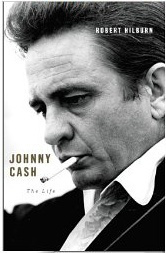 Robert Hilburn’s Johnny Cash: A Life isn’t likely to make many fans among those who adored Walk the Line when it came out a few years ago. Among the many less savory facts Hilburn passes along, you learn that Cash was never able to entirely kick his addictions, going on and off pills until the end of his life. In addition, his marriage to June Carter, usually held out as a model of spousal devotion, wasn’t exactly smooth going for either of them. In fact, more than once they came close to breaking up. And yet Hilburn’s work had the support and participation of both the Cash and Carter clans, and his cover blurbs include a very positive one from Rosanne Cash herself. So what’s up? Why would family members want a book that shows the family patriarch in a less-than-glowing light?
Robert Hilburn’s Johnny Cash: A Life isn’t likely to make many fans among those who adored Walk the Line when it came out a few years ago. Among the many less savory facts Hilburn passes along, you learn that Cash was never able to entirely kick his addictions, going on and off pills until the end of his life. In addition, his marriage to June Carter, usually held out as a model of spousal devotion, wasn’t exactly smooth going for either of them. In fact, more than once they came close to breaking up. And yet Hilburn’s work had the support and participation of both the Cash and Carter clans, and his cover blurbs include a very positive one from Rosanne Cash herself. So what’s up? Why would family members want a book that shows the family patriarch in a less-than-glowing light?
My guess would be because an honest portrait of Cash is more interesting than the usual country hagiography. Hilburn’s affection for Cash is clear—he’s a former music writer for the Los Angeles Times, and he knew Cash from his glory days. Unlike the Hollywood screenwriters who came up with the “feel-good” version of Cash’s life for Walk the Line, Hilburn knows that there are no easy answers to the question of what makes an artist great. There were times when Johnny Cash was a lousy human being, and there were times when he was a transcendent human being, much like the rest of us. And out of this roiling mixture of good and not-so-good, Cash was able to create some spectacular, enduring music.
When I finished Hilburn’s book, I felt drained, but I also felt like I wanted to listen to a lot of Johnny Cash, not just the songs I already had, but the ones I had yet to hear (including the several albums he recorded with Rick Rubin at the end of his life). I had a new appreciation for the complexity of his music and the maelstrom of his life that produced it.
And I think perhaps that’s the problem with our preference for the “feel-good” version of some famous lives. It’s comforting to think that Johnny found June and all his problems were over. We want to believe that other people’s marriages are perfect even though our own demonstrably are not. But that point of view downplays how difficult it is both to be a functioning artist and to have a functioning marriage. I write fiction that emphasizes happy endings, but that doesn’t mean I’m not aware that those endings are a lot more difficult in “real life.”
The thing is, though, Cash’s life does have a “happy” ending, or at least a satisfying one. At the end, his work with Rick Rubin produced some of the best music he’d ever done, and he left Rubin with a treasure trove of songs to be gradually released. Of course, this artistic triumph was accompanied with failing health, financial problems, and the death of the wife he’d come to cherish although he didn’t always treat her well. But that’s the way life is—triumph mixed with disaster, good times and misery.
We fiction writers get to shape our events to our own specifications, but biographers don’t have that luxury. It’s to Hilburn’s credit that even within the tough strictures of reality, he still manages to come up with a treatment that leaves me feeling both exasperation and admiration for Johnny Cash. He was real, and that’s enough.


March 26, 2014
Hungry Heart – Peace, Love, and Barbecue
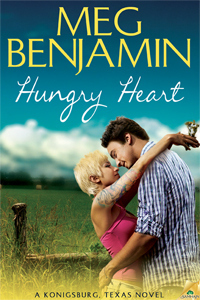 When you’re thinking about a romantic dinner, or maybe just the romance of food in general, barbecue probably isn’t your first choice. Barbecue was originally blue collar food, or sometimes even no collar food. You don’t put filet mignon into your smoker, needless to say. You put cuts of meat that are so tough they need all day over the coals to break down and become delicious.
When you’re thinking about a romantic dinner, or maybe just the romance of food in general, barbecue probably isn’t your first choice. Barbecue was originally blue collar food, or sometimes even no collar food. You don’t put filet mignon into your smoker, needless to say. You put cuts of meat that are so tough they need all day over the coals to break down and become delicious.
Even now, when barbecue has achieved a kind of cult status among regional food, you don’t think of it as something you’d fix when you want to inspire passion in your sweetie (unless it’s a passionate argument over the presence or absence of tomato-based sauce). But barbecue is also a way of life for some cooks, both professional and amateur, and it was that fact that I wanted to talk about in my eighth book set in Konigsburg, Texas: Hungry Heart.
My heroes are both passionate about ’cue. One, Harris Temple the Barbecue King, cooks barbecue professionally, selling it off his truck in downtown Konigsburg. The other, Chico Burnside, is an amateur pit master who’s come up with his own sublime recipe for pulled pork. Harris and Chico decide to join forces on a competitive barbecue team (yes, there really are competitive barbecue teams—lots of them), entering Konigsburg’s first Fourth of July barbecue cook-off.
Of course, Harris and Chico both have Significant Others who complicate things. Harris’s girlfriend is Darcy Cunningham, sous chef of the Rose restaurant, who’s a lot more skilled in professional cooking than he is. But when it comes to barbecue, Darcy’s newbie, and a sarcastic newbie at that. Chico’s true love, Andy Wells, has a barbecue background of her own, but it’s bittersweet. Andy’s ex-husband was a competitive barbecue cook and his devotion to barbecue (along with his own “winning” personality) broke up their marriage.
It’s these four people who make up the barbecue team and provide the romance. Because when you’re doing things together, even if those things involve brisket and pork loin, romance can flourish. Here’s a quick excerpt:
He lifted his hand, brushing the hair back from her temple with his fingertips.
Not a good idea. You shouldn’t get involved here. But all of a sudden she couldn’t exactly remember why she shouldn’t.
He leaned forward slowly, maybe giving her a chance to run. A chance she wasn’t going to take. His lips brushed hers, lightly, as his hands cupped her face. He rubbed his thumbs across her cheekbones, dark eyes watching her carefully.
The flecks of green had deepened, making his eyes even darker now. She leaned forward, placing her hands on his shoulders, bringing her mouth against his more firmly. The contact seemed to send an arrow of heat through her body, making her nipples ache, her pulse warm again.
His mouth opened against hers and she let him inside, rubbing her tongue against his, feeling it rasp against her teeth. She sucked his lower lip for a moment, nipping him lightly, hearing the catch in his breath.
His hands dropped to her breasts, cupping, then rubbing them, his palms brushing her nipples to hard points. She felt cool air against her back as he pushed her shirt up, his fingers fumbling with the catch on her bra. His lips drifted down the side of her throat, leaving a trail of heat as he did.
She pushed his shirt up, running her fingers through the slight dusting of hair across his chest, then down along the ripple of muscle over his stomach.
His hands cupped her breasts, pushing the bra aside. He leaned down, taking one nipple into his mouth, sucking, his tongue laving the aching peak.
Somewhere behind them something beeped loudly. Porky came awake with a woof.
“Shit.” His hands dropped to her hips, his forehead pressed against her breasts. “Shit. Fuck. Goddamn.”
“Timer’s beeping,” she muttered. “And Porky’s awake.”
He nodded, his forehead still resting on her collarbone.
“Fire’s ready. And you’re behind with the meat as it is.”
He raised his head to look at her. “I didn’t plan this.”
“I know.” She wasn’t entirely sure what he meant—the timing with the meat or the timing with the two of them. She brushed a hand across his cheek, pushing his hair back from his face.
“I don’t want to stop.”
“I don’t either.” She slid back a few inches, moving her hands to his shoulders. “But like you once said, barbecue waits for no man.”
“Shit,” he repeated. “Caught in my own trap.”


March 14, 2014
Konigsburg #8 Is On the Way!
 Hungry Heart, my eighth book set in Konigsburg, Texas, will be released by Samhain Publishing on March 25. There are some familiar characters along with some new faces, and a whole lot of information about barbecue.
Hungry Heart, my eighth book set in Konigsburg, Texas, will be released by Samhain Publishing on March 25. There are some familiar characters along with some new faces, and a whole lot of information about barbecue.
Here’s the blurb:
Hungry Heart
Peace, love, and barbecue—with a big order of sexy on the side.
Konigsburg, Texas, Book 8
Sous chef Darcy Cunningham is less than entranced with small-town Konigsburg’s obsession with barbecue. But her future career as a chef de cuisine requires expanding her culinary horizons, so she talks the Barbecue King, a.k.a. Harris Temple, into taking her on as his apprentice.
However, learning Harris’s professional secrets wasn’t supposed to include falling for his spicy blend of smoky sexiness and laid-back charm.
Chico Burnside specializes in flying under Konigsburg’s small-town radar, but lately life has been going a little too smoothly, even for him. Hoping to shake things up a bit, he talks Harris into teaming up for Konigsburg’s first barbecue cook-off. But once shy scientist Andy Wells catches his eye, Chico’s got more on his mind than brisket. Like enticing her out of her shell to show her just how tenderly a big guy can love.
As the competition ignites, so does the romance. Until a natural disaster threatens to derail Konigsburg’s dream team before the grills even get good and warmed up.
Warning: Contains hot sauce, hot sex, and a whole lot of smokin’ action.


January 22, 2014
Happy Medium Is Here
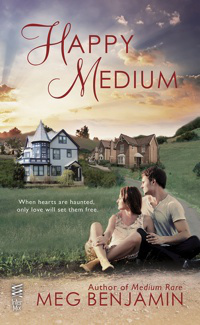 Happy Medium, the third book in my Ramos Family Trilogy, is now available at the usual outlets. All three of the Ramos Family books feature reluctant mediums, siblings who were previously unaware of the family legacy of communication with the dead. The hero in Happy Medium is Ray, the youngest sibling who specializes in home renovation. That’s a good job to have in San Antonio’s King William District with its historic houses. But the house Ray is working with this time has all kinds of problems, including a very nasty ghost. Here’s the blurb:
Happy Medium, the third book in my Ramos Family Trilogy, is now available at the usual outlets. All three of the Ramos Family books feature reluctant mediums, siblings who were previously unaware of the family legacy of communication with the dead. The hero in Happy Medium is Ray, the youngest sibling who specializes in home renovation. That’s a good job to have in San Antonio’s King William District with its historic houses. But the house Ray is working with this time has all kinds of problems, including a very nasty ghost. Here’s the blurb:
Love is good for the soul… unless it’s one that you’re trying to exorcise.
Ray Ramos has a problem–the King William District mansion he and his business partner purchased for a fast renovation needs more work than expected. Ray could use a quick infusion of cash. Enter Emma Shea, assistant to Gabrielle DeVere, the star of American Medium. Gabrielle is looking for San Antonio houses to use for her televised séances, and Ray’s fixer upper seems to fit.
When Gabrielle does a sample séance, Ray and Emma become the target of a touchy ghost with no respect for boundaries. After Ray learns his family has a special affinity for ghosts, the two decide to investigate the haunted house. It doesn’t hurt that Emma is immediately attracted to the laconic Ray or that Ray is intrigued by the buttoned-down beauty who seems determined to hide her considerable assets behind sober business suits. But can the two of them fight off a vengeful succubus bound to the house while getting a lot closer than either of them planned?
The other two books in the series are Medium Well and Medium Rare. For those who’d like to catch up, here’s a little information about both of them.
Love At Second Sight
Real estate agent Danny Ramos has always had a knack for selling homes, but when his boss saddles him with a neglected carriage house, Danny discovers that his abilities are more than simple intuition…
On his first visit to the house, Danny is confronted with visions of a violent murder. His assistant, Biddy Gunter, doesn’t seem affected, and Danny starts to think he’s going crazy—until he gets a visit from his mother, who suggests that Danny’s uncanny talent to sell old houses may stem from his family inheritance: psychic empathy.
When Biddy reveals to Danny her own strange dream about the carriage house ghosts, they team up to investigate and discover both the house’s dark history and their own unexpected attraction. But as the hauntings turn from unsettling to downright dangerous, Danny and Biddy need to figure out how to rid the house of its ghostly inhabitants, before their budding romance meets an untimely end…
There are no skeletons in her closet…only ghosts
Rose Ramos was a reference librarian, until she inherited her grandmother’s house—and the family talent for connecting with the other side…
Moving into the lovely Victorian in San Antonio’s King William District is a dream come true for Rose—and also a nightmare. That’s the only explanation she has for the man hovering above her bed. But Skag is a ghost who’s been part of Rose’s family for generations. And now he’s all hers.
When Evan Delwin, a reporter out to debunk the city’s newest celebrity, posts an ad looking for a research assistant to investigate a famous medium making his home in San Antonio, Skag suggests that Rose apply for the job. Delving into the dark side has its own dangers for Rose—including trying to resist Delwin’s manly charms. But as the investigation draws them closer together, the deadly currents surrounding the medium threaten to destroy them all…



